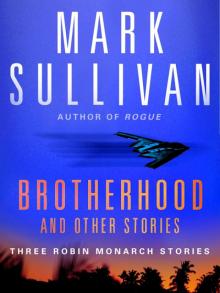- Home
- Mark Sullivan
The Last Green Valley Page 20
The Last Green Valley Read online
Page 20
Night had fallen. Will was so tired, Emil put him on his shoulders and carried him back to the tent. As they walked, Walt said, “Mama? Is Heinrich Himmler God?”
“What? No! Whatever are you talking about?”
“You said dinner was a gift from heaven, and the major said it was a gift from Himmler,” Walt said. “How does that make sense?”
“It doesn’t,” she said wearily. “Whoever it came from on earth, it was a gift to us from above. That’s what I believe.”
For once that seemed to satisfy Walt, and soon Adeline had both boys tucked into bed on their cots in their tent.
“They don’t have to go pee?” Emil said.
“They said they were too tired,” Adeline said.
“I have to go.”
“I do, too,” she said.
They left Malia to listen for the boys, took the lantern, and went to the latrine. Emil was done quickly and stood outside waiting for Adeline when Nikolas walked up and stopped a yard away with a knowing smile on his face.
Emil hardened, said, “I guess a busted knee wasn’t enough to make you hear.”
“I hear just fine,” Nikolas said, the smile becoming a gloat. “I heard exactly what Sturmbannführer Haussmann told me a few moments ago. With the hair and the beard gone, he recognized you, Martel. He remembers who you are now.”
PART THREE:
THROWN TO THE WIND AND THE WOLVES
Chapter Eighteen
Adeline exited the latrine and saw a tall man limping away from Emil, who stared after him, appearing deeply shaken in the lantern light.
“What’s the matter, Emil?”
“Just tired,” he said, though he would not meet her gaze.
“Isn’t he the same man who came to our camp on the Romanian border with the major?”
“Was he?” Emil said. “He asked me where the medical clinic was, and I showed him. Are you sure?”
Adeline was almost sure but gave Emil the benefit of the doubt, and they walked back to the tent in silence. He immediately took his coat off and climbed beneath the blanket. She soon put out the lantern and joined him, spooning him from behind.
“They’re asleep,” she whispered.
“What?”
“You know. If you want?”
There was a long silence. “I’m beyond tired.”
Adeline rolled away from him onto her back and closed her eyes. She could feel the tension coming off her husband in waves. When he got like this, she’d learned to give him room. If something was bothering Emil, he’d come to her once he’d figured out a way to solve the problem. It was just the way he was, and she fell asleep telling herself that maybe he was right: some things were not worth knowing.
The following day, the Martel family went through five hours of interviews and document inspection. At each of eight stations, they were questioned by as many as six immigration and naturalization officers about everything from their personal history to potential occupations to the value of the lands they left behind. They were also photographed and subjected to full medical examinations that included detailed measurements of their skulls, jaws, and arm and leg bones as part of racial research commissioned by Himmler himself.
At the end of the process, each family was given a framed picture of Adolf Hitler, granted provisional resettlement identity cards, and told they would be moved to more permanent quarters once the quarantine was lifted.
The newest residents of the führer’s Greater Germany quickly fell into the military-like rhythm of refugee-camp life. Though the boys had spoken German and some Russian from birth, they were enrolled in a makeshift school within days, learning to spell, read, and write in proper German and to master the basics of mathematics. Except for Karoline and Lydia, the adults were given jobs. Malia and Marie worked in the laundry, while Adeline toiled in the kitchen, which suited her because she adored cooking and learned something new from the cooks there every day. Johann swept the pathways between the first eight rows of tents. Emil was ordered to work emptying the latrines, which he did stoically. As he told himself repeatedly, My family is safe. The food isn’t what it was the first night, but we’re being fed and given a place to live. Cleaning the latrines is the least I can do.
Emil came back to the tent every evening after removing the coverall Haussmann’s men gave him and after taking a shower with a strong lye soap that gave him its own peculiar, lingering odor. Day after day turned into the middle of June 1944, and still, Adeline never once heard her husband complain about his shitty lot.
About that time, however, Adeline began to notice the food deliveries coming into the kitchen had dropped in both quality and quantity; and she overheard one of the cooks talking about Rome falling to the Allies and the Wehrmacht in pitched battles against the Allies in France, all of which was drawing manpower and supplies from all regions of the Reich west into France and south into Italy.
When she murmured this all to Emil, he became excited because he said it meant the western Allies had invaded Europe and were coming for Hitler.
“Don’t you see?” he whispered. “The Allies? They’re our way west, Adella. All we have to do is get to them and surrender.”
She looked at him like he’d lost his mind. “You want to walk through Poland and Germany into France, past the Wehrmacht, through the battle, and live long enough to surrender? First of all, you’re not a soldier. Neither am I. We can’t surrender.”
“It doesn’t matter. If we can get to the Allies, however we do it, we’d be their refugees. We can work for them, Adeline. If I must, I’ll clean toilets the rest of my life. Maybe they will send us west across the ocean as thanks for our hard work.”
Adeline frowned. “That’s a big maybe when I have two young boys, a mother, and a sister to think about, not to mention your parents and my cousin and the twins. And Rese. Do you want your sister to run through bullets and bombs to surrender?”
“No,” he said. “We’ll carry Rese if we have to. And the bullets will miss us.”
“Now you are sounding like Corporal Gheorghe. And you haven’t even been hit in the head.”
She was trying to be funny, but it got him outright angry. “That’s right: I have not been hit in the head. And I am not anything like Corporal damned Gheorghe!”
She held up both hands. “Take time to think it over, Emil. We can’t leave the camp’s grounds, so we can’t go looking for the Allies at the moment anyway.”
That calmed Emil down for several days until word spread through the camp that the quarantine would soon be lifted and they’d be moving into permanent quarters in the small city of Wielun southwest about twenty-two kilometers. Emil started studying the position of the stars in the northern hemisphere from a book the boys had been given in school.
“You haven’t read a book in years,” Adeline said. “Why are you interested in that?”
He scowled at her. “I may only have a fifth-grade education, but I can read and write, and I’m not stupid.”
She blushed. “I never said you were, Emil. I just wondered.”
“If you know the position of the stars, you can find your way at night, Adella, which I think might help us getting to the Allies and becoming their refugees.”
“Walking at night?”
“Yes. Only at night.”
“We’ll fall on our faces,” she said. “We’ll break our noses or our legs.”
Emil sighed. “Or we might make our way to freedom.”
He tried to spend time every day listening behind the SS officers’ latrines for news of the war and trying to figure out how long it might take them to get to the Allied lines. At night, Emil stood outside, studying the North Star in relation to the constellations. But every time he brought up the subject of running west after they were released from the camp, Adeline became more and more upset.
“I won’t do it,” she said finally.
“You will,” Emil replied. “At some point, you’ll have to decide where you want to spend you
r life—in slavery or in freedom—and if you choose freedom, you’ll have to run through a no-man’s-land with bullets zinging around your head to get there. I don’t think there’s any way around it. If we want that life, we’ll have to risk death for it.”
They were awoken at dawn on a late-June day, told to gather their things and to report to the parade ground, where Major Haussmann was waiting at the microphone.
“Your quarantine is over,” Haussmann said. “The belongings you surrendered at the train station will be returned to you, and you will be given an address, a key, and a map to your home as well as an explanation of the food-rationing system, which is important if you wish to eat. Once in their new homes, adults must report to their EWZ officer to be assigned to jobs according to their skills.”
“What about Rese?” Emil’s mother fretted.
“I told you, Mama,” Emil said. “The doctors said she’s recovering and will be brought to us in Wielun as soon as she is able to travel.”
They were told to organize themselves by the boxcars they arrived in, with the Martels’ boxcar the first to go. Soon they passed through the gates for the first time in five weeks. It was a beautiful, warm summer day. Their little wagon was one of the first to be unloaded from the truck, and everything was as they’d left it, even the dried foodstuffs.
Emil received the key, the map to their quarters in Wielun, and their first ration cards. Emil studied the map, which showed their new homes reachable by one of three routes. He was lost in calculating the distance of each route when he heard Major Haussmann say, “Martel?”
Looking up, Emil saw Major Haussmann standing there, in an at-ease position, gazing directly at him. He felt his gut roil. He’d thought once they were beyond the gate that they were rid of the man forever. But there Haussmann stood.
He lowered the map and said, “Yes, Major?”
“A word before you go, bitte,” the SS officer said. “In private.”
“Of course, Major,” Emil said, feeling worse, looking at his wife and kids, wondering if it was for the last time, before following the SS officer down the fence line of the camp, over a roll in the terrain, and down into a deep dip in the field where they could not be seen from the road.
The major pivoted to face him, his Luger drawn, with the same furiously amused expression Emil had seen on Haussmann’s face that night in Dubossary long ago. Emil threw up his hands, terrified.
“I knew I’d seen you before, even with all the hair and the beard,” Haussmann said. “But with it all gone, I knew it was you, which is strange because I’ve seen tens of thousands of faces since that night. Yet yours stood out. Why is that, Martel?”
Emil debated whether to remain silent, but then said, “I don’t know, Major.”
“I do, actually,” Haussmann said, laughing acidly. “Your face stood out because it belonged to the first true coward I faced in Ukraine. You remember, don’t you, farm boy?”
Emil took a deep breath, said, “Major, that rule was—”
“I don’t give a damn about some other coward’s rule,” he seethed, shaking the gun.
“Himmler’s rule,” Emil said.
“What does Reichsführer Himmler know, really? Was he in the field with rifles and pistols, solving his Jew problem? No. I was in the field solving his Jew problem. I should have shot you that night, and I didn’t. And now, miraculously, I have a chance to fix that.”
Haussmann’s pistol rose, and Emil, trembling, looked over its barrel at the Nazi. “You’re going to just shoot me?”
“I’ve done it before.”
“Wait, please,” Emil choked. “I have been a good German since. Please, all I want is a better life for my family. I beg you not to leave my wife a widow and my sons without a father. My wife’s father was taken to Siberia and was never heard from again. She couldn’t bear being left like that.”
Haussmann pulled the trigger.
Adeline was still watching the knoll Emil had disappeared over with Major Haussmann when she heard the flat crack of the gunshot and jerked violently. Her hand flew to her mouth, and she staggered left and stabbed out her hand to grab the side of the little wagon.
“No,” she gasped weakly.
“Mama?” Walt said, rushing to her. “What just happened?”
Adeline stood there in shock, staring at the knoll and the last spot where she’d seen Emil, silently screaming from the depths of her soul for God to spare and protect him.
Please, God, if there was ever a good man, a good father, and a good husband, it’s Emil Martel. In all my years of knowing him, he’s never wavered from doing what was right. Not once. He deserves better than this; he deserves—
A second shot shattered the morning.
Emil was on his knees, shaking from head to toe, ears ringing, and sure he was about to die because both shots had gone right past his ears and slammed into the embankment behind him. Haussmann wouldn’t miss a third time.
He looked up to see the Nazi smiling at him and then lowering the Luger.
“It is enough,” Haussmann said. “Seeing you like this, quivering, about to crap your pants. It’s enough. I used to have to see them die, watch the blood and the life drain out of them. But about a year ago, I realized I enjoyed the begging and the reaction to the intentional first missed shot more than I did the actual kill. Seeing you destroyed is enough, Martel. Get up. Go back to your family.”
Feeling weak as a lamb and distrusting the man, Emil got unsteadily to his feet and looked walleyed at Haussmann. “I can go?”
“Yes, but don’t think for a second your punishment is over,” the major said. “It will go on well after I am gone. I’ve made sure of that. And as you and your family suffer in the months ahead, I want you to think about your acts that night in Dubossary. Your cowardice.”
He gestured at Emil’s jacket. “I want you to think about the clothes you’re wearing and the place you’re blessed to live in because of people like me. And I want you to decide whether you really do want to be part of the Third Reich, or whether you should go back to living under Stalin and his filthy Yids.”
Will had begun to cry. “Mama! Where is he?”
Adeline couldn’t answer. She was still fixed on that point on the knoll where she’d last seen Emil, still praying to God to deliver him, when she caught movement.
Walt, who’d stood up on the wagon, screamed, “It’s him! It’s Papa!”
Adeline started running toward Emil as he crested the knoll. Walt and Will did, too. But he held up his hands, shook his head, and ran to them as they slowed.
“What happened?”
“A rat,” he said, pale and sweating as if he’d been running for an hour, and gesturing at the wagon. “Let’s go. Now!”
She wanted to press him, but she could see he was in no mood to be pressed.
“They said lorries are coming for us soon.”
“I don’t care.”
They assumed their positions fore and aft of the little wagon. Emil began to pull it hard across the open ground. Adeline, Malia, and Lydia puffed to stay with him.
“Slow down, Emil,” Adeline gasped. “We can’t keep up.”
“Then I’ll pull it myself until we’re in the forest,” he said, and strained all the more.
Ten minutes later, with the rest walking and only Emil and Adeline still moving the wagon at a trot, they went over a rise in the road and into the shade of hardwoods. Only then did he slow. Only then did he grunt, “Enough. That’s enough.”
Still holding on to the wagon handle, Emil stopped, leaned over, and panted. Then he heaved and vomited violently.
“My God, Emil!” Adeline said, rushing to his side. “What happened?”
“I just needed water,” he said. “From the running.”
She got him a cup of water, looked back, and saw the boys jogging to them. Emil gulped the water. By sheer will, he stood and wiped his face clean to meet them.
“We’re okay,” Emil said, throwing his arms
around them and stealing glances at Adeline. “We’ll go to our new home now. We never have to think of that place or that man ever again.”
Chapter Nineteen
Trucks rolled by them. One stopped to let them load their wagons. Two hours later, they arrived in Wielun, the very first town Hitler attacked when he invaded Poland in 1939. A sizable portion of the town still lay in ruins from the Wehrmacht and Luftwaffe bombardments. The buildings left standing were either empty or filled with resentful Poles, who glared at the Black Sea Germans as they unloaded their meager belongings and set out to find their new place in the world.
There had been no canvas roof on the rear of the truck, so Adeline had been able to see that the surroundings were largely farmland. Much of it had lain fallow, which surprised her and made her anxious. If crops weren’t being raised, how were they to eat? The dry goods they’d brought from the East would last only so long.
She voiced her concerns to Emil as they wandered through the narrow streets and bomb rubble, looking for their new home.
“They said we get ration cards,” Emil said. “Besides, I don’t want to stay here long. At some point, Adeline, we have to go west.”
“At some point. But not now. The boys need a calm life for a bit, and so do I.”
They found the address: a gray, dilapidated, three-story, wood-framed building badly in need of repair. The building’s front stoop sagged. The door hung crookedly on its hinges and moaned when Emil used the key to open it, revealing a narrow hall and a narrower staircase that ascended into shadow.
There were six apartments inside, two on each floor. The first-floor flats were uninhabitable. Emil’s parents and Adeline’s cousin Marie and her twins took the second-floor apartments. Emil’s family and Adeline’s mother and sister would take the third-floor flats.
The air inside was hot and rank with human odor. When they climbed the staircases, the risers made cracking and popping noises as if they’d break away under their feet.

 Beneath a Scarlet Sky
Beneath a Scarlet Sky The Last Green Valley
The Last Green Valley Beneath a Scarlet Sky: A Novel
Beneath a Scarlet Sky: A Novel Brotherhood and Others
Brotherhood and Others The Purification Ceremony
The Purification Ceremony